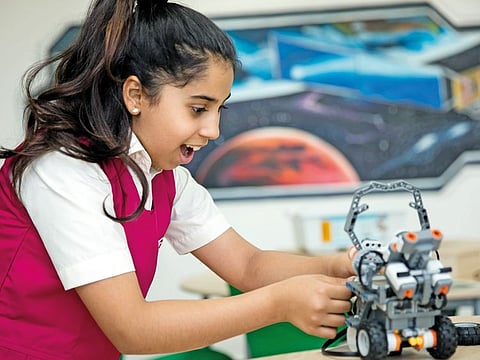How UAE schools are innovating to stay ahead
Leading UAE schools weigh in on how to now best prepare students for the future

Students today will enter a brave world of working that includes a much more multicultural environment, advanced new technology — and of course, the ongoing repercussions of the pandemic.
But with new challenges and unexpected events come great opportunities for advancement. Perhaps many of the ‘old ways’ were due for a shake up anyway.
UAE schools have been quick to tackle the issues and the focus is on getting kids future-ready and equipped to deal with real-life scenarios in the new normal. For teachers and school leaders, flexibility and being alert to changing circumstances are essential.
“Our school is prepared to transition across a spectrum that includes 100 per cent distance learning, a blend of online and in-person learning, as well as a fully on-campus model, following the directives and regulations of local authorities,” says Dr Becky Berg, Interim Superintendent, American School of Dubai (ASD).
For students, remote learning has provided an opportunity to develop skills in prioritising and pacing their work, organising their own workspaces, and designing their own schedules.

Her school’s teachers have adapted quickly to the variety of modes of instructional delivery by mastering new technology and employing more online resources than ever.
Distance learning has brought benefits to ASD pupils that will last into their future careers.
“For students, remote learning has provided an opportunity to develop skills in prioritising and pacing their work, organising their own workspaces, and designing their own schedules.”
Curriculum and instructions
The school prides itself on a future-ready curriculum and currently offers courses in electronics design, robotics, engineering solutions, computer programming, technical film production, digital art, music technology, and more. It even has a thriving sustainable garden.
One new Dubai school that is set to open in September — The Royal Grammar School Guildford Dubai — is primed to support personalised learning for all pupils with a maximum class size of 20 in EYFS and 22 in subsequent years.
Craig Lamshed, Founding Principal at RGS Guildford Dubai, says his school will offer a USP of “five hundred years of pioneering heritage, knowledge, and practice of what makes a great education from RGS Guildford Dubai’s home school in the UK.”
The recent situation has highlighted the importance of genuine relationships for supporting children in moving their learning forward.

He says Covid has highlighted a practice that great schools have been using for many years — distance learning.
“I was recently talking to colleagues about the ‘school of the air’ in Australia, where schooling has been delivered via radio to remote areas since 1951,” he says. “Clearly this has moved on significantly over the last 70 years with the use of online learning platforms that enrich learning, support collaboration, and provide different ways of working — all of which have really come to the forefront in the last five years. That said, the recent situation has highlighted the importance of genuine relationships for supporting children in moving their learning forward.”
Keys to success
In terms of truly being future-ready, Deb Hughes, Principal at Liwa International School for Girls (LISG), has a clear definition. “It means providing learners with critical thinking, creativity, and collaboration as schools now prepare students for jobs that have not even been created,” she says.
“At LISG, we work to embed 21st century skills across the content for a future-ready curriculum. Even during remote learning, we provide a broad and balanced curriculum. We highly value both academic subjects and enrichment programmes to enable learners to have a curriculum that allows them to explore their interests and talents. Our thematic planning allows us to incorporate the students’ interests and identity into the teaching and learning.”
Personalised and adaptive e-learning platforms allowed teachers to meet students where they currently are and continue learning seamlessly.

Before Covid-19, LISG was an early adopter of many online platforms and resources, allowing students to move quickly into distance or remote learning.
“Personalised and adaptive e-learning platforms allowed teachers to meet students where they currently are and continue learning seamlessly. Teachers and students are growing in the use of platforms new to them, such as NearPod, Flip Grid, and Padlet, to increase student collaboration in distance learning,” adds Hughes. ■
Strategies for engaging students in virtual classrooms
“Covid-19 is changing the way teaching and learning is taking place worldwide. For SABIS/Choueifat, it put our education technology (EdTech) on the fast track and we have been able to seamlessly transition from physical to online delivery of lessons. Our advanced edtech enables us to mirror the physical classroom to the home. Students have access to e-books, the lesson is presented on their personal devices as it is on the smart TVs in the classroom. Online students raise their hands to ask questions and can participate interactively with fellow students. Additionally, to support their learning, students have access to a comprehensive set of worksheets and online interactive quizzes via the SABIS Digital Platform (SDP) application, and get real time feedback on their understanding of concepts.” —Rami Malak Deputy Regional Director for Academic Operations, SABIS Regional Center – UAE GN Focus report


![Social media claims of cancellations dismissed; official updates to be shared through authorised channels. [Illustrative image]](http://media.assettype.com/gulfnews%2F2025-11-15%2Fx2mp12df%2Fexam.jpg?w=320&auto=format%2Ccompress&fit=max)
